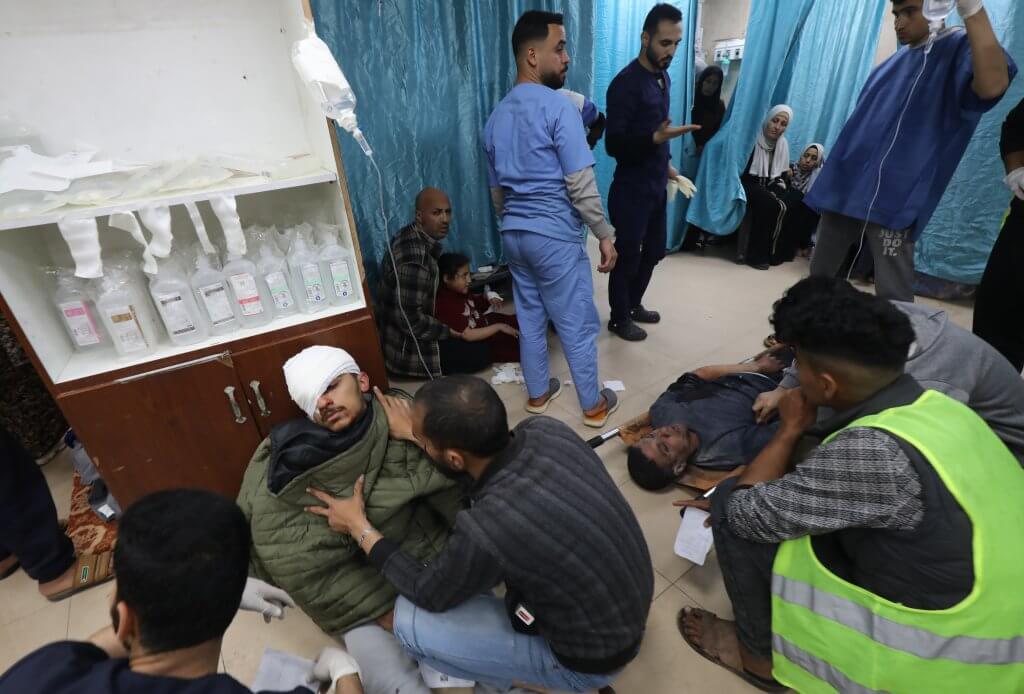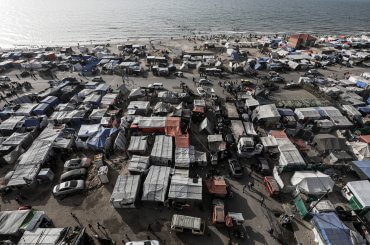Recently, Secretary of State Anthony Blinken finally admitted to the fact that the situation in Gaza is nothing short of a humanitarian catastrophe. This comes after multiple UN agencies have warned that Gaza is at imminent risk of famine — a preventable crisis caused by the Israeli blockade of aid shipments. This has been the fastest drop in nutrition status for a population in modern history, and the situation is dire. Multiple children have died from malnutrition already, and Palestinians in Gaza are not getting the requisite amount of water to survive either. According to UNICEF, more than 13,000 children have been killed, and thousands of others have been maimed. This marks what might be “the largest cohort of pediatric amputees in history,” as Dr. Ghassan Abu Sittah, a plastic surgeon from the United Kingdom who recently visited Gaza, told the New Yorker.
By almost every measure, this is one of the greatest man-made public health catastrophes of our age. It is, as many experts have now declared, a genocide. While the International Court of Justice has not yet ruled on whether genocide is taking place (these legal proceedings would take years), their January 26 ruling did observe that “at least some of the acts and omissions alleged by South Africa to have been committed by Israel in Gaza appear to be capable of falling within the provisions of the (Genocide) Convention.” Moreover, the ruling compels Israel to improve the humanitarian situation in Gaza. In this context, it is incumbent upon us, public health researchers, to speak out and apply pressure to end this genocide and get Palestinians in Gaza the life-saving aid they need. Though our field is theoretically made up of people who care about social justice and the basic rights of all people to health and safety, we have too often encountered a culture of silence on this and other public health crises.
We do not study global health, nor are we researchers who study the impacts of conflict on health. We study overdose prevention and harm reduction here in the United States. We see the impacts of dehumanization on the people we work with every day. Dehumanization, of course, is a process through which people begin to be seen as “less than human,” such that it becomes acceptable to deprive that group of people of rights afforded to others. It is because of this dynamic repeating itself in Gaza that we see it as our professional duty to speak out about Gaza and feel that our colleagues across the public health profession should do the same. This is our lane — it should be yours, too.
Beyond the moral imperative to speak up against dehumanization and human suffering, we must have solidarity with our Palestinian medical and public health colleagues who have been testifying about working under horrifying conditions, having to work with no medicines and anesthesia, under constant Israeli fire. Israel has, to date, killed more than 680 Palestinian healthcare workers, according to the World Health Organization, which has also documented more than 400 attacks on healthcare facilities. As a result, the majority of the Gaza Strip’s hospitals are out of operation or operating at extremely limited capacities. American, Canadian, and British doctors who have visited Gaza have all relayed their horror stories. Palestinian doctors have also provided horrifying accounts of being taken by Israeli forces and being subject to torture.
Still, some in our field feel it necessary to justify these attacks in the pages of prestigious medical journals, repeating without concrete evidence that hospitals like al-Shifa are operational bases for Hamas (a lie that has been consistently debunked). These lies are easily believed because Palestinian suffering and death are rendered acceptable as collateral damage by governments and institutions, and they are seen as untrustworthy narrators of their own suffering.
This dehumanization was on clear display when, last October, President Joe Biden declared that he had little confidence in casualty numbers reported by the Gaza Ministry of Health — numbers that even the State Department has declared to be accurate and even an undercount. And, of course, Donald Trump and other Republicans traffic in dehumanization frequently, stating, for example, that Israel should “finish the problem.” His nephew, Jared Kushner, meanwhile, is busy planning for a Gaza without Palestinians, commenting about the strip’s “very valuable beachfront property.”
Dehumanization is something we are familiar with as researchers working in harm reduction. The people we work with, people who use drugs, are often talked about by politicians and the media as people without agency who are problems to be dealt with, rather than people who deserve care. The nation’s response has mostly been to subject people who use drugs to incarceration, structural violence, or ostracization from society. Systemic racism also plays a critical role, as many of the people most impacted by the reach of the drug war are Black, Latine, and Indigenous people. Dehumanization lays the groundwork to normalize suffering and allow horrendous acts of violence to occur, which adversely impact people’s health, oftentimes fatally. We cannot stand for dehumanization here or abroad, as the public health and social consequences of such are often disastrous.
Why Palestine?
Sometimes, colleagues ask us why we are focusing on Palestine when there are other conflicts in the world that are being ignored. Indeed, there are major crises happening in Haiti, Sudan, and Congo, among other places that demand the world’s attention. Indifference here is deadly, and we are all implicated in not doing enough to stop the various public health catastrophes happening worldwide. But the United States is doing more than being indifferent in Gaza — it is actively providing the weapons for the slaughter.
Since October 7, the U.S. has completed more than 100 separate military sales to Israel. The U.S. has also vetoed ceasefire resolutions at the United Nations (albeit abstaining on the most recent resolution) and has now defunded UNRWA after suspending funding to it due to unsubstantiated claims that UNRWA employees participated in the October 7 attack. In allowing and enabling such violence to occur, we undermine U.S.-backed global health efforts around the world and further enable a culture of impunity where nations can massacre people without consequence. A status quo such as this will have far-reaching impacts, especially for the global south.
There are all sorts of links that we can draw between our work and what is going on in Gaza at the moment. But besides that, we as human beings have a fundamental responsibility to speak out and intervene when we witness genocide. This alone is reason enough. It is what draws people across academic fields, advocacy movements, cultures, and nations to call for a ceasefire and an end to the siege on Gaza. We join our colleagues from across the public health profession in that call and urge more of our colleagues to do so.



UN expert Francesca Albanese has revealed in her latest report that she had found reasonable grounds to believe Israel committed genocide in its war on Gaza.
The US State Department and Israel have reacted angrily to her report accusing her of antisemitism.
https://youtu.be/ok0MzcifBSY?si=NjefJOjdZgu4nLlv
I keep trying to wrap my head around the US state machine unconditional support for Israel aside from it being a moribund imperialist giant in a fight for its life… of which you speak to here in terms of the cultural death and sorrow aka ‘the war on drugs’…
I feel upset with my own humanity that an appropriate figure if 100 Palestinians murdered every day.. is expected… and wonder what is wrong with my heart ❤️ And then I figure the only way that is normal and the US seeks even closer unconditional bonds with that bitch is if the same scale of massacres is ready to be the norm in some form in the USA itself… it’s the only way to make sense of the sick abnormality.
But even then, there is no justification for the dehumanisation of Palestinians as well as the dregs if American society who reject its culture in their pain with drugs… 💊
George Bernard Shaw called the Irish Potato Famine “a starvation” – Food could have been easily procured by the British and other authorities, but wasn’t. Possibly thousands of tons of food and water are waiting on trucks to go into Gaza, but are stopped by the Zionists, (including with Christian Zionist support, though Biden appears to be wavering). This is a deliberate policy of starvation – a blatant act of GENOCIDE. Please stop calling starvation a “famine”. Famine it is not. There is food-a-plenty waiting to go into Gaza